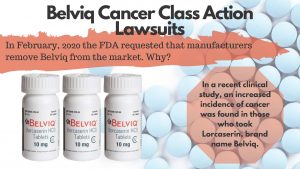If someone told any lawyer following mass tort litigation that the next big class action lawsuit would involve a diet drug that causes cancer, the reaction would be “that sounds right.” Diet drugs have an awful history and we are seeing more and more drugs and products associated with cancer.
Lorcaserin (brand name: Belviq) was “voluntarily” taken off the market last week by its manufactu rer at the request of the FDA.
rer at the request of the FDA.
Why? In a clinical study, an increased incidence of cancer was found in those who took Belviq. The FDA recommends that patients talk to their doctors about stopping Belviq. If you were diagnosed with cancer after taking Belviq, call us today to discuss your Belviq cancer lawsuit at 800-553-8082 or get a free online claim evaluation.
What Is the History of Belviq’s Approval?
When Belviq was approved by the FDA in 2012, it was the first weight-loss medication to get the green light from the agency in over a decade. Previous weight-loss medications resulted in scandal after they were linked to pulmonary problems. There were similar concerns when Belviq was being approved. In fact, at the time, the nonprofit consumer advocacy group Public Citizen urged the FDA not to approve the drug due to effects on the cardiovascular system.
However, the drug’s manufacturer, which was then Arena Pharmaceuticals (Arena later sold Belviq to Eisai), conducted three clinical trials, the results of which assured the FDA that the benefit of the medication would outweigh risks. And there would be a warning on the label about heart valve complications and another about how interactions with other weight-loss medications were untested.
How Is Belviq Linked to Cancer?
It ended up being cancer, not heart complications that led to the Belviq recall in February 2020. A clinical trial conducted between 2014 and 2018—during the period when the drug was approved and being prescribed by doctors—found an increased risk of cancer in Belviq users. More than other cancers, people who took Belviq were diagnosed with pancreatic, colorectal, and lung cancer.
This finding did not come out of the blue. In fact, concerns about cancer had contributed to the FDA’s denial of Belviq’s approval when the company made its first attempt in 2010. Clinical trials that Arena Pharmaceuticals presented to the FDA during its approval showed an increased incidence of tumors in laboratory rats that took Belviq.
Apparently, Arena Pharmaceuticals conducted further studies and gave additional evidence to the FDA to prove that the risk of cancer for humans was smaller than the clinical trials at first suggested. According to the Medical Review included in the FDA’s Drug Approval Package for Belviq, which was published in the summer of 2012:
“As part of the NDA resubmission, an independent blinded pathology working group readjudicated the mammary tumors; their findings mitigated the diagnostic uncertainty and provided an adequate safety margin for adenocarcinoma. Mammary fibroadenoma was still noted at all doses. The relationship of fibroadenoma to circulating prolactin remains uncertain. Prolactin is only modestly elevated in animals (and humans) with lorcaserin. Finally, drug concentrations in the cerebrospinal fluid (CSF) of human volunteers also provided an adequate safety margin for the astrocytoma finding. Despite these reassuring findings, I think cancer surveillance should be considered as part of the CV outcomes trial. Lorcaserin has been characterized as a carcinogen in rats, and I am not convinced that we fully understand its effects with respect to tumor promotion in humans.”
The report stated a need for a “CV outcomes trial” a further clinical trial to assess risks to the cardiovascular (CV) system. Cancer surveillance would be a part of that trial. And today, the trial now complete, that cancer surveillance has revealed an increased risk of cancer associated with Belviq.
Can We Blame Arena Pharmaceuticals and Eisai?
It is normal for drugs to have rare, but serious side effects and interactions. No medication is without risks. However, an increased likelihood of cancer for anyone who takes a drug is unacceptable. The questions that remain have to do with the rigor and transparency of Arena Pharmaceuticals and Eisai.
Did those who pushed for and approve the drug know the true risks? Did they do enough to prevent harm from coming to those who took their new medication? Did they have the public’s best interest at heart?
Importantly, there was an argument between Arena Pharmaceuticals and the FDA about how the cancer findings from rats should be interpreted. The company didn’t think they showed too great of a risk, but the FDA did. Eventually, the FDA changed its mind.
So were mistakes made and what safety ignored? Let’s look at the securities class action was brought against Arena which claimed that the company failed to adequately disclose the information about the cancer findings to its investors. Why this did not set off more alarms with doctors, lawyers, and regulators is crazy. Investors who bought Arena filed a lawsuit claiming they should have put out information about concerns about the drug’s safety and the likelihood of FDA approval without mentioning the rat studies. The case settled for $24,000,000, and those who invested in Arena between 2008 and 2011 could apply for compensation.
The FDA Approval Process
 In recent years, the FDA has come under fire for loosening its enforcement standards. Others claim that a faster approval process benefits sick people who are looking for new treatment options. The argument was laid out in a New York Times editorial opinion published in January 2020 that said,
In recent years, the FDA has come under fire for loosening its enforcement standards. Others claim that a faster approval process benefits sick people who are looking for new treatment options. The argument was laid out in a New York Times editorial opinion published in January 2020 that said,
“There is a deep tension between groups that want medical products to be proved safe and effective before they are made widely available and those that say that as long as those products pass a bare minimum of safety testing, patients should be able to decide for themselves.”
Indeed, the agency has always had to walk a tightrope between wanting to approve medications that are desperately needed and needing to prevent dangerous drugs from entering the market. In the 2010s, when Belviq was being approved, the FDA was supposed to be more strict about approving drugs—it had learned from previous obesity drug recall fiascos. Time will tell how this new recall with Belviq plays out.
Are Lawyers Taking Belviq Lawsuits?
Another important question is what will the cases brought against Eisai look like and what is the settlement value of a Belviq cancer case? Because it is so early, the only honest answer is who knows? But we can look at the settlement value of the Roundup cases that are going very well and appear to be valued in the ballpark of $500,000. So that is a benchmark for the settlement value of an individual Belviq case. Is that how this litigation will turn out? Absolutely no one knows.
What we know is that drug recalls have historically resulted in class actions, mass torts, or multi-district litigations (MDLs). These are large lawsuits in which a group of people all sue together or are represented by a single member.
Some similar legal actions that are currently underway are cases against Zantac, a heartburn medication, and against the weed killer Roundup, both of which have also been linked to cancer. The Roundup cases, for example, were consolidated into an MDL. They will all be handled in a single district by a single judge. The plaintiff’s attorneys will be able to pool resources, and it will be easier from plaintiffs from across the country to file suit. It is likely that the Zantac cases will also become an MDL.
Hiring a Lawyer
No lawsuits have been filed yet because of the new Belviq recall. Are they coming? They are coming. Our lawyers are still gathering information and seeking cases from possible victims. If you took Belviq and have been diagnosed with cancer, call our lawyers today at 800-553-8082 or get a free online claim evaluation. We will attentively listen to your story and talk to you about your options.
 Maryland Injury Law Center
Maryland Injury Law Center

